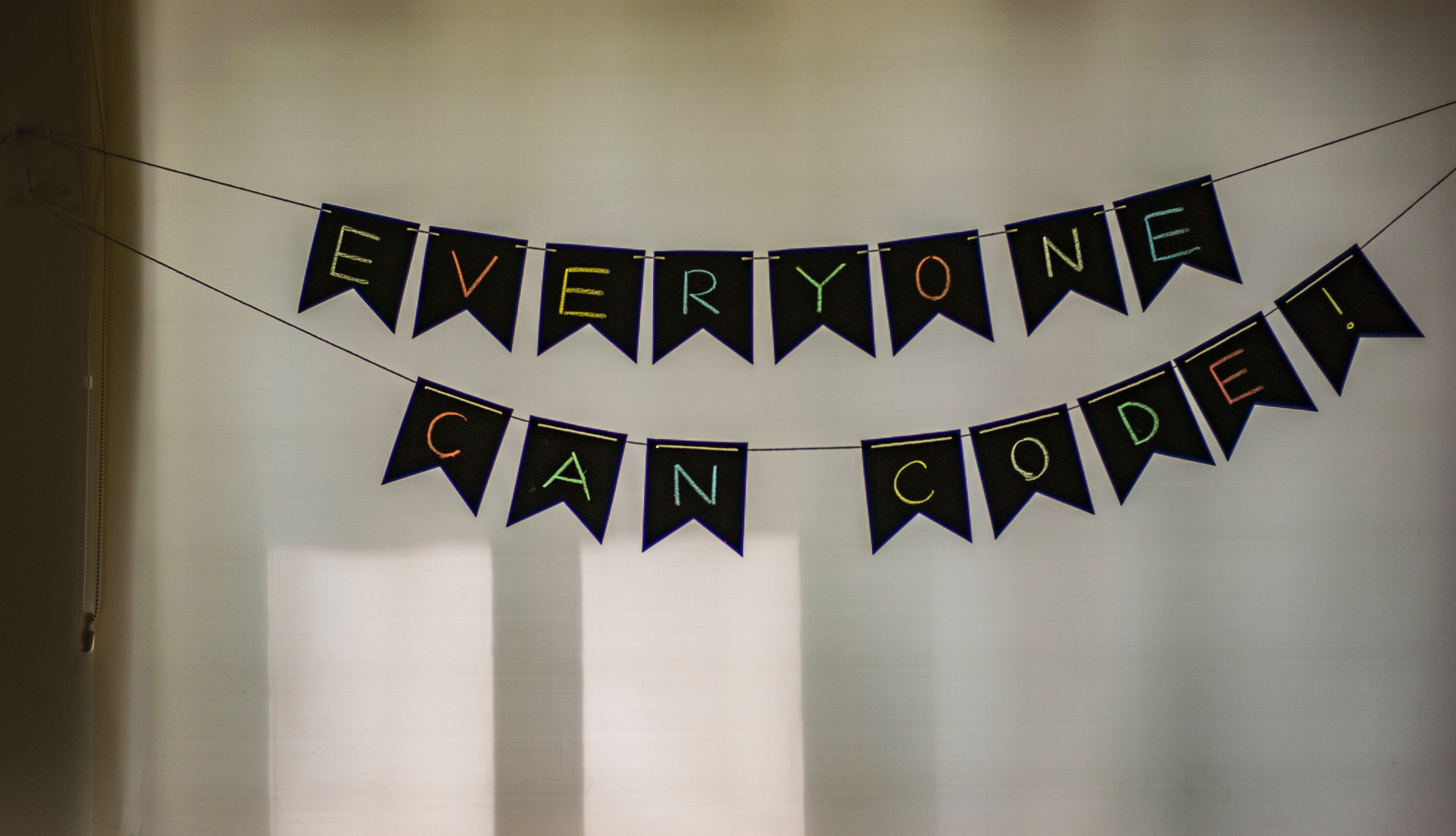What You Must Know Before You Write Your First Line Of Code.


Photo by Dmitry Chernyshov on Unsplash
What You Must Know Before You Write Your First Line Of Code.
I am not going to be mincing my words here. You’ve seen great programmers, read about them, heard them give speeches, talked to a few, and here you are inspired and all fired up to start your journey as a software developer. Truth be told, you’ve taken the right step in the right direction.
When I started out, there were a few things people told me, my brothers gave me the best advice possible and a few developers around me also helped me. Yeah, I was lucky enough to have found myself around them but as I continued, I understood that there were tons of other things I should have understood before writing my first line of code and today, I’ll be sharing them with you.
It would be in your best interest if you read to the very last points. The best is saved for last, and you wouldn’t want to miss anything.


Photo by Adi Goldstein on Unsplash
13 things You Must Know Before Writing Your First Line Of Code.
1. Learning To Code Is Not Easy
This may come as a shocker, but it’s the hard truth. Learning to code is not easy. You may have heard people and read blog posts of people saying learning to code is the easiest and best thing that they ever did. Coding being the best thing? Yeah. Being the easiest thing? No. Don’t get me wrong, learning to code is an easy skill to learn, but one of the hardest to master and excel at, except you want to remain at a beginner level for a very long time. This point here is to help you prepare your mind and make you see the need to put in all your efforts and be determined to excel in it. Hard work makes the whole difference.
2. Have A Good Reason Why You Want To Code
Whenever anyone comes to me saying He/She wants to learn to code, the only question I ask is, “Why do you want to code?” It’s essential to have a very solid reason why you want to code. Starting out, I wanted to code because I knew I could change the world with my codes, I can make life better, build software and products that will help improve the quality of life in Africa and around the world, I wanted to be an agent of change, a technopreneur. You must have a solid reason to wanting to code. Programming is not for everybody but can be done by anybody. Don’t learn to code because it’s trending, don’t learn to code because you want to oppress your peers and make them feel like they’re beneath you, don’t learn to code because of peer pressure, don’t learn to code because you want have that sense of belonging, you want to sound all geeky and talk all techie. If this is why you want to code, I am sorry to inform you but you’ll definitely give up along the way, or remain a beginner forever. It’s not bad to want to learn programming because you want to make a lot of money out of it. It’s in fact a very good reason. Just have a good reason, write it down someplace where you can always see it everyday in case you want to give up, you look at it everyday and let it be that extra motivation you need to excel.
3. Programmers Never stop Learning
As a newbie in programming, it is essential to understand what you’re getting yourself into. Programmers never stop learning. Some years ago, it was all about FORTRAN, LISP, COBOL, BASIC, now it’s all about JavaScript, Java, Kotlin, Swift, Python among others. Even these programming languages have evolved over time. They have become more efficient and more readable. JavaScript has over 15 libraries and frameworks, and even these frameworks and libraries evolve. New ways of implementing codes, better architecture and various improvements. So it’s very essential to understand that as a developer, you’re not allowed to press your peddle when it comes to learning. You must be willing to learn new things always. It’s very vital.
4. Specialize
As a newbie in programming, it’s hard not to get distracted. I started out as a web developer, took some courses and before the next two months, I was learning native android development, before the next month, I had switched to IOS. I remember my elder brothers coming home and scolding me. They warned me I’d never make it as a developer unless I specialize. At that point, I felt they didn’t want me to be better than them or Improve. Turns out I was wrong, and they were right. I ended up spending over a year as a developer without being able to build a single website, a single screen android app or even a single screen IOS app. There are tons of programming languages for different purposes. Specialize. Pick a niche and focus there. Do you want to be a native android developer then Java or Kotlin should do. You want to build IOS apps, swift should do. You want to be a web developer, Html, Css, JavaScript and so on. You want to build mobile for both IOS and Android, React-native or Flutter among others should do.The list is endless. What I am saying in essence is, there are hundreds of programming languages for different platform and different things. Pick a niche, master it as much as possible before moving on to another niche.
5. It’s Normal To Admit That You Don’t Know
Now you know that as a programmer it’s essential to keep learning. Your next question might be “What if I don’t understand after I watch tutorial videos or read blog posts?”. It’s normal to not understand a concept initially. Welcome to the world of programming, where everyone is still learning. As a developer you must know that you need to ask questions. Keep your pride aside and seek the knowledge you crave. If you don’t understand anything, be open about it, there’s no shame in admitting what you don’t know, nobody can help you if they don’t know where you’re lagging. This is very important to note. Be willing and always ready to admit what you don’t know. At least be honest with yourself.


Photo by Jan Tinneberg on Unsplash
6. Be Patient With Yourself
You must have seen people talk about how they landed their first job as a junior developer in just two months after they started out learning to code, you must have read so many of those triumphant tales. Now don’t get me wrong, I’m not disputing the fact that it’s possible, but such stories should not make you punish yourself. You can start out learning to code today and in two months cover so many topics and land your first gig. It’s possible. But you need to understand that you must be patient with yourself and give yourself time to process, understand and get grounded in a concept. Don’t let anxiety derail your progress.
7. Programming is not ‘La Cram ‘La Pour ‘La Pass ‘La Forget
If you are a Nigerian, you must be very familiar with this phrase. It begins with Cramming tutorials and every necessary information needed in examinations then giving it back in the answer sheet verbatim, then after the exam, you completely forget everything you’ve read. Programming is not like that. You must be willing to study for the sake of understanding not the other way around, you need to be grounded in the whole process. Learning to understand and never forget is key in programming.
8. Practice Is Important
Like they always say, practice makes perfect. When starting to program, it’s essential to practice often. Write codes everyday for a minimum of 1 hour if possible. Try to code as often as possible, follow the materials religiously, and always be hungry for more, that hunger is what should drive you. You also stand a chance of retaining 90% of what you learn if you practice promptly.
9. Seeking For Answers Is Essential
When it comes to programming, you must be able to search for answers on your own. Education is what people instill in you, learning is what you do to yourself. Own your learning. There’s no error message you’ll get as a beginner that have not been resolved before. You must be able to use google very well. Even experts at google still use google search to search for answers when they are stuck and this happens almost every now and then. Mirthful right? Yeah. There’s no way to overemphasize this. You must be ready to search for answers. Always use google, stackoverflow, reddit, quora or youtube. Answers and help are at your fingertip unlock them and leverage on them.


10. Join A Community
Like people often say, No one is an island of knowledge on their own. You have to join a group of like minded people, with same goals and purpose. You may be thinking that you don’t need anyone, just the internet, a laptop and the will to learn. Sure, but the truth is, learning to code as a loner is quite boring and you’ll get demotivated. Most times all you need is that little nudge from someone else, just seeing the progress someone within your community is making can go a long way to propel you to do more and learn more. Also, make sure to attend physical meetups as often as possible. Make friends and look for someone to pair program with if possible.


Photo by Gaelle Marcel on Unsplash
11. Follow One Resource At A Time
There are tons of materials out there to use when starting out to program, and it’s very possible to get drawn away and get very easily distracted by the wealth of materials to learn from at your disposal. This was a major setback for me when starting out to code. I downloaded so many tutorials, so many Pdf’s saved so many blog posts that I ended up getting distracted and stagnated for a long time. I ended up deleting everything. As a newbie you must understand that it’s essential to focus on a resource at a time. Get a Pdf and a video tutorial or whichever works for you, and focus on it till you exhaust it. We talked about Seeking Answers earlier. In the process of using a resource to learn to code, you’ll definitely hit some blocks, at this point you don’t need to change a material, all you need to do is search for answers in a community you’re a part of, let people know what the problem is, search for answers on Google, Reddit, Quora, Stackoverflow or youTube. When I started out, whenever I had any issue, I just ditched the material and get a new one. I was going in circles and not making headway. You shouldn’t make such mistake.


Photo by bruce mars on Unsplash
12. Never Doubt Yourself
Impostor syndrome is one of the major problem every self-taught and newbie programmer faces at one point or another. It makes you feel like a fraud, like everyone else is better than you, like you can never succeed in that field, but the truth is, it’s all in your head. You need to understand that this is a feeling every expert programmer have faced at one point or the other. You’re not the first and will definitely not be the last. You shouldn’t doubt yourself or your ability. If anyone else can succeed you also can succeed. Be determined to succeed.
13. Build! Build!! Build!!!
Like the saying goes, you never know until you do. Look for projects to work on as you learn, don’t wait until you feel comfortable before you start practicing with actual project. contribute to various opensource projects, by doing so, you not only work on projects, but you learn from top developers as well, you get to read their codes, fix bugs and add your codes. Overall, working on personal projects and opensource projects will go a long way in helping you develop as a programmer.


Photo by NeONBRAND on Unsplash
14. Teach Someone Else To Program
This to me is by far the most essential point to note before writing your first line of code. You want to learn to code and improve substantially within a short time? Teach someone else to code. This is what almost everyone will not tell you, but it’s the master key to learning to code efficiently. Teaching someone to code helps you in two ways. It gives you a sense of responsibility for the learning and advancement of someone else. You wouldn’t want your student beating you in coding challenge would you? Just knowing the fact that someone depends on you will make you study even harder. Secondly, study shows that we tend to retain 90% of what we learn when we teach someone or practice immediately. This is a proven fact. When you teach someone a concept you learn in programming, it helps you to better understand it. If you make mistake at that instance, you’d be able to correct it immediately and it sticks to your brain. As you’re teaching also, you’re cementing the concept into your brain. So which ever way you want to go, teaching someone to code is actually a win win situation.


Now that you made it this far, there’s nothing stopping you from being the world class developer that you are meant to be. 💪 💪 🔥 🔥